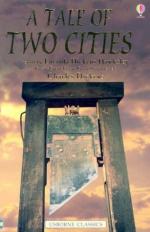|
This section contains 935 words (approx. 4 pages at 300 words per page) |

|
Dickens's Views of the French Revolution
Summary: In Charles Dickens's "A Tale of Two Cities," the author reveals his enthusiasm for the revolutionaries, but finds the violence inherent in the revolution abhorrent.
"Sow the same seed of rapacious license and oppression ever again, and it will surely yield the same fruit according to its kind." (385) This quote from Charles Dickens' A Tale of Two Cities illustrates Dickens' bias for the revolting class during the French Revolution. In the book, however, Dickens does vilify the violence that is inherent in this Revolution. He also puts his own slant on the way the Revolution occurs and who leads it. This bias could be attributed to who he was and who his audience was. Because he is an Englishman and the novel is written primarily for other Englishmen, there is a clear bias in the way he presents the classes (through a variety of characters that exemplify each Fcaste) and their actions in the novel that seems to sympathize with British ideals and notions on the Revolution.
First of all, Dickens presents a...
|
This section contains 935 words (approx. 4 pages at 300 words per page) |

|


